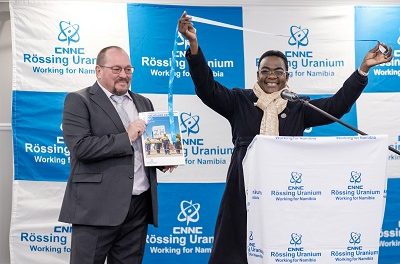
Kazapua inks cooperation agreement with Belo Horizonte in Brazil

Mayor Marcio Lacerda of Belo Horizonte and Mayor Muesee Kazapua of Windhoek signing the Memorandum of Cooperation witnessed by Rodrigo Perpetuo, Secretary for International Relations of Belo Horizonte (with microphone) and Chris Eita, Manager for International Relations at the City of Windhoek.
Windhoek’s Mayor, Councillor Muesee Kazapua, was highly inspired by a previous visit to Belo Horizonte and joined the delegation to sign cooperation agreements with Belo Horizonte and the World Future Council – the organisation that facilitates the knowledge exchange between experts on “Zero Hunger” programmes and African cities. Councillor Uillika Nambahu, Mayor of Walvis Bay, felt impressed and inspired by the food banks, urban agriculture activities, and food assistance to children in day-care centres and schools. She said she was keen to come home to take action and share the knowledge gained in Brazil with other Mayors of Namibia in her role as President of the Namibian National Mayor’s Forum. “In Belo Horizonte they care for their people in every aspect. We realise that in Namibia our existing efforts need to be harmonised.” Walvis Bay has already taken first steps towards establishing community gardens for their low-income population, especially targeting vulnerable groups such as HIV and Aids patients, the Mayor said. The Food Security Programme of Belo Horizonte shows that the Human Right to sufficient and healthy food can be transformed into a reality. The policy ensures the right to food for everyone. With its 20 interconnected programmes, the policy has eliminated hunger and malnutrition from the city, boosted the local economy and secured the livelihoods of small-scale agricultural holdings. “What was intended as a knowledge transfer on the food security model of Belo Horizonte grew into a wider cooperation, including education and cultural issues, not only between the cities of Belo Horizonte and Windhoek but between Brazil and Namibia. This type of local, city to city exchange can be a model in itself on how to tackle the challenges of our times efficiently, joining hands to create healthy, just societies and protecting the rights of current and future generations,” remarked Lorena Fischer, Policy Officer of the World Future Council. James Kalundu, Manager Community Services of the City of Windhoek, is fascinated that the programmes are not only about the provision of food but about a balanced and healthy diet: “the meals we saw and ate ourselves, they were so colourful and diverse!” He finds that the Belo Horizonte community gardens are a viable and working concept and wants to implement them by learning from Belo Horizonte’ s approach to encourage people to work in the gardens. While Namibia boasts a strong tourism sector, there are hardly any apprenticeship or training programmes in the food handling sector and youth unemployment remains high. Therefore, representatives were very interested in the “Pao Escola”, a training programme in the food-handling sector for professions such as bakers, chefs, and waiters. They discussed a “train the trainer” programme with experts from Brazil coming to Namibia to capacitate future trainers in the food handling sector.












































